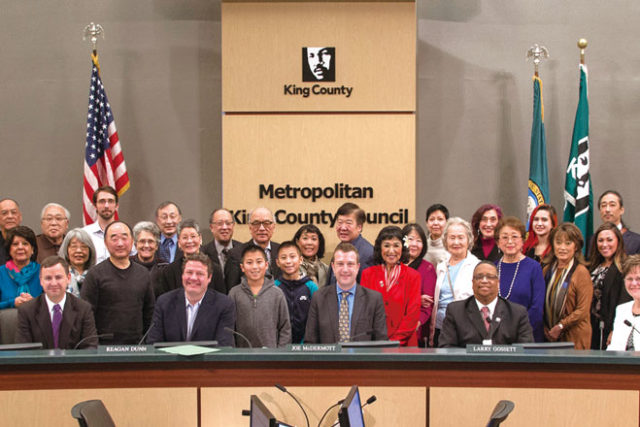By Shihou Sasaki, Dana S. Mar and Mao Osumi
The Seattle area presented various Day of Remembrance events to commemorate the 75th anniversary of the signing of Executive Order 9066 (EO9066), which resulted in the mass incarceration of people of Japanese descent along the West Coast, toward the current political and social injustice situations around the nation.
A special program entitled, “How Could Concentration Camps Happen?” was held at the University of Washington (UW) Kane Hall, gathering about 600 audience members to discuss and learn about mass incarcerations in comparison through histories and their social backgrounds.
Speakers included Dee Simon, the Baral Family executive director of the Holocaust Center for Humanity, and Tetsuden Kashima, professor emeritus of American Ethnic Studies at the University of Washington and Lorraine Bannai, professor of lawyering skills and Director of the Fred T. Korematsu Center at Seattle University.
Sponsored by the UW American Ethnic Studies, the Consulate-General of Japan in Seattle, the Nisei Veterans Committee, the Holocaust Center for Humanity and the Japanese American Citizens League Seattle Chapter, the commemoration was a part of the three-event series to examine the history and similarities between the Japanese American incarceration and the Holocaust during World War II. The next events will be held in April.
“Never Again: Japanese American WWII History and American Muslim Rights Today,” a presentation and discussion about Japanese American incarceration during World War II and its correlations to persecutions faced by American Muslims, was held on Sunday at Fisher Pavilion, Seattle Center.
According to an event organizer, about 1,500 attendees joined to mark the 75th anniversary of the Japanese American incarceration and learn about the circumstances of American Muslim children and families today.
Densho presented the event in partnership with CAIR-WA, The Seattle Public Library Foundation and ACLU of Washington. Featured speakers included spoken word poet Troy Osaki, Mayor Ed Murray, Congresswoman Pramila Jayapal, Tom Ikeda, executive director of Densho and Arsalan Bukhari, the Director of CAIR-Washington State.
“I really liked this intergenerational atmosphere because connecting dots between past and present is very important,” Osaki said.
“Today marks not just a memorial about the past, but the message that we are never going there again,” commented Seattle Mayor Ed Murray.
The Minidoka Pilgrimage Planning Committee (MPPC), an all-volunteer committee dedicated to honoring “generations that were at Minidoka by sharing stories of their imprisonment,” also held its annual Day of Remembrance Taiko Fundraiser at Seattle University. Local taiko groups Inochi Taiko, Okinawa Kenjin Kai Taiko, UW Taiko Kai, Kaze Daiko, Seattle Kokon Taiko and Seattle University’s newly formed SU Hidaka Taiko performed with high energy at Pigott Hall.
The event successfully attracted about 350 attendees through the MPPC’s hard work and contributions from the community. All of the proceeds from the fundraiser go to the Elder and Youth scholarship program to help recipients attend the Pilgrimage.
This year, members of the Muckleshoot Canoe Family, who historically shared close ties with the Nikkei community, gave a performance that offered solidarity to the community and honored those who endured the incarceration.
Minidoka Pilgrimage Scholarship recipients Melia Lawrence and Marie Johnston gave their project presentation in which they jointly photographed and interviewed participants while on site this past Pilgrimage.
The event also welcomed international student Kholood Alabdullatif, who related a story from Nazanin Zinouri who visited family in Iran and was denied reentry to the US. Alabdullatif earned her Masters in Educational Administration and is currently pursuing an Educational Doctorate in Educational Leadership at SU.
Yosh Nakagawa also attended as the keynote speaker to impart his hopes for the community. “Today, I want all of you to give thanks to each other because your story is so essential. America needs good news again,” he said, “good news from you.”
Despite the rain, around 30 people attended a vigil held at the Japanese American Remembrance Garden on campus following the program.
On Tuesday, both the King County Council and the Seattle City Council declared proclamations in remembrance of EO9066 and those who subsequently suffered under its effects. Densho Director Tom Ikeda read the King County Council proclamation just moments before receiving the Seattle City Council proclamation read by City Council President Bruce Harrell.
Dozens of community members observed the sessions in which local politicians recognized the historic injustices done to the people of Japanese descent.
Bill Tashima of JACL noted that many Issei and Nisei have passed in the last 75 years. Tashima expressed the importance of recognizing those who were directly affected by and who struggled with the incarceration.
Karen Yoshitomi, executive director of the Japanese Cultural and Community Center of Washington, shared her comment that the political representatives should never forget how the Executive Order 9066 was issued with three causes, “race prejudice,” “war hysteria” and “failure of political correctness.”
At City Hall, Bruce Harrell spoke of his personal connection through his mother who was among those incarcerated. The proclamation recognizes the injustices done to the people of Japanese descent and promises the City of Seattle will welcome immigrants and refugees with equity and inclusion.
“We realize what happens when fear seems to govern the day and not kindness or rational thought,” said Harrell.
Tom Ikeda also gave a brief speech. Consul General Masahiro Omura and Wing Luke Museum director Beth Takekawa also attended for the remembrance proclamation.
Washington State Legislatures held its annual Day of Remembrance session last Wednesday where it passed two resolutions.






Photos by Shihou Sasaki Dana S Mar Mao Osumi and Geraldine Shu







